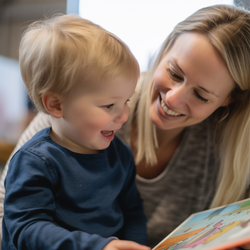Understanding Emotional Intelligence in Toddlers: A Key to Healthy Development
Posted by M. Camovic - Schwarte on Jan 19th 2024
As parents, we all want our little ones to grow up happy, healthy, and able to get along well with others. One key part of this is helping them understand and manage their feelings, a skill known as Emotional Intelligence (EI). Let's break down what this means for your toddler and how you can help in simple, everyday ways.
What is Emotional Intelligence in Toddlers?
Think of EI as the 'people skill'. It's about recognizing feelings - both in ourselves and others - and handling them well. For toddlers, this is a new and exciting journey. Around age two, they start to notice emotions and react to them. This is when they begin to learn empathy, which means understanding how others feel.
Why Playtime Matters
Believe it or not, playtime is more than just fun. It's a classroom for EI. When toddlers play, especially with others, they learn about sharing, waiting their turn, and dealing with the ups and downs of games. Pretend play is especially good. When your child pretends to be a doctor, a teacher, or a parent, they're practicing how to think and feel like someone else.
Talking About Feelings
Helping your toddler put feelings into words is a big step in EI. When they can say, "I'm sad" or "I'm angry," they're on their way to handling those emotions better. You can help by naming these feelings for them. When they're upset, you might say, "It looks like you're feeling frustrated." This helps them learn what different emotions are called.
Learning by Watching You
Remember, you're a role model. How you handle your emotions shows your toddler how to deal with theirs. When you talk about your feelings calmly and solve problems without getting too upset, you're teaching them to do the same.
Everyday EI Tips for Parents
- Label Emotions: When reading a book or watching a show with your child, point out the characters' emotions and talk about them.
- Praise Efforts: When your child tries to express their feelings or responds well to others, let them know they're doing a great job.
- Stay Calm: Try to keep your cool during tantrums. It's tough, but it shows your child how to handle strong emotions.
- Play Together: Join in their playtime. It's a great way to teach them about sharing and caring.
- Talk About Your Day: Share simple stories about when you felt happy, sad, or frustrated. It helps them understand that everyone has feelings.
Understanding Challenges
It's normal for toddlers to be self-centered and have big emotions. They're still learning. Be patient and remember that every child develops at their own pace.
Conclusion
Helping your toddler with EI is all about teaching them to understand and manage feelings - theirs and others'. Through play, conversation, and your own example, you can guide them on this exciting journey. It's a path that leads to better friendships, less tantrums, and a happier child. So, take it one step, one feeling at a time. You're helping build the foundation for a well-rounded, emotionally healthy adult.

